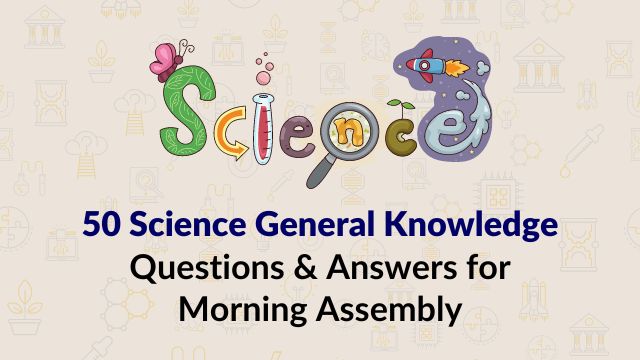50 Fun and Challenging Science General Knowledge Questions & Answers for Morning Assembly (2023)
Science Trivia for Morning Assembly: Daily School Morning assemblies are an excellent platform to impart knowledge and Create a sense of curiosity among students. This time can be made even more enlightening by introducing interesting science general knowledge questions. Let’s dive into a list of 50 science GK questions, suitable for students and guaranteed to trigger their scientific curiosity.
Importance of Science General Knowledge Questions & Answers for Morning Assembly
1. Fosters a Scientific Temper:
Beginning the day with a science gk question stimulates the curious minds of students. This Science based GK Quiz encourages them to think rationally, promotes analytical thinking, and nurtures the spirit of inquiry right from the morning.
2. Enhances Knowledge Base:
Students are constantly learning, and introducing science GK questions in the morning assembly ensures that their repository of knowledge is consistently updated. Students get awared of the world around them and the scientific principles that govern it.
3. Promotes Peer Learning:
Discussing and answering questions in a communal setting, like an morning assembly. These Science based multiple choice questions allows students to learn from each other. Those who know the answer get a confidence boost, while others learn something new.
4. Encourages Interdisciplinary Thinking:
Sometimes, science GK questions could relate to history, geography, or current events. Science and these subjects are connected to each other that emphasis the idea that all general knowledge is related, that promotes interdisciplinary thinking.
5. Creates a Daily Learning Habit:
Incorporating science questions in the morning assembly instills a daily learning habit among students. This science trivia quiz for students emphasis the idea that every day is an opportunity to learn something new for everyone.
6. Enhances Engagement and Participation:
These type of interactive nature of Questions and answers sessions can make morning assemblies of school more engaging. Students participate, answer the science questions, and sometimes even frame GK questions of their own.
7. Builds Confidence:
Answering the GK science questions in front of other students can significantly boost any student’s confidence, also students get positive reinforcement for their correct answers.
8. Raises Awareness about Current Scientific Developments:
Current affairs related to science, such as space missions, medical important discovery, or important environmental issues, can be introduced through these amazing GK science based MCQs questions, that make students more aware of the world’s scientific advancements.
9. Makes Science Accessible and Fun:
By including science into everyday school life through fun and engaging GK MCQs questions, science becomes less difficult and more easy or understandable. If students take part in GK Quiz trivia, they will not consider science as just a simple subject but as a better or fascinating way to understand the world.
10. Prepares Students for Competitive Exams:
General knowledge of science is also majorly included in competitive exams. Regular practice of such science based GK questions can indirectly prepare students for future challenges.
50 Engaging Science General Knowledge Questions & Answers to Start Your Day

Engage students with our “Science Quick-Fire Quiz for Morning Assembly.” Rise and shine with daily trivia, from the “Morning Assembly Science Challenge” to “Science Brain-Boosters.” Kickstart your day with science and dive deep into fascinating topics.
1. Question: What planet is known as the ‘Red Planet’?
Answer: Mars
2. Question: Which gas do plants absorb from the atmosphere for photosynthesis?
Answer: Carbon Dioxide (CO2)
3. Question: Who is credited with the theory of relativity?
Answer: Albert Einstein
4. Question: What is the human body’s largest organ?
Answer: The skin
5. Question: Which metal is liquid at room temperature?
Answer: Mercury
6. Question: What is the powerhouse of the cell?
Answer: Mitochondria
7. Question: How many bones does an adult human body have?
Answer: 206
8. Question: What is the chemical symbol for gold?
Answer: Au
9. Question: Which planet has the most moons?
Answer: Jupiter
10. Question: Who invented the telephone?
Answer: Alexander Graham Bell
11. Question: What force pulls objects towards the center of the Earth?
Answer: Gravity
12. Question: Who developed the periodic table?
Answer: Dmitri Mendeleev
13. Question: Which planet is known for its rings?
Answer: Saturn
14. Question: What is the chemical symbol for silver?
Answer: Ag
15. Question: What do you call the study of birds?
Answer: Ornithology
16. Question: Which vitamin is also known as ascorbic acid?
Answer: Vitamin C
17. Question: What is the hardest natural substance on Earth?
Answer: Diamond
18. Question: Where in the human body would you find the femur bone?
Answer: Leg (thigh)
19. Question: Which gas is responsible for the greenhouse effect?
Answer: Carbon Dioxide (CO2)
20. Question: Who discovered penicillin?
Answer: Alexander Fleming
21. Question: What is the chemical symbol for water?
Answer: H2O
22. Question: What do you call the study of stars and planets?
Answer: Astronomy
23. Question: What is the smallest unit of life?
Answer: Cell
24. Question: Who is known as the father of evolution?
Answer: Charles Darwin
25. Question: What do you call a scientist who studies weather?
Answer: Meteorologist
26. Question: Which blood type is known as the universal donor?
Answer: O negative (O-)
27. Question: What is the largest mammal on Earth?
Answer: Blue Whale
28. Question: Who proposed the three laws of motion?
Answer: Sir Isaac Newton
29. Question: What is the center of an atom called?
Answer: Nucleus
30. Question: How many teeth does a normal adult human have?
Answer: 32
31. Question: What is the chemical symbol for iron?
Answer: Fe
32. Question: What do you call the study of earthquakes?
Answer: Seismology
33. Question: What element does ‘O’ represent on the periodic table?
Answer: Oxygen
34. Question: Which planet is closest to the sun?
Answer: Mercury
35. Question: Who is known as the father of modern physics?
Answer: Galileo Galilei
36. Question: Which bird is known for its beautiful tail feathers and dance?
Answer: Peacock
37. Question: What do you call a baby kangaroo?
Answer: Joey
38. Question: What is the chemical symbol for salt?
Answer: NaCl
39. Question: How many colors are there in a rainbow?
Answer: 7
40. Question: What is the most common gas in the Earth’s atmosphere?
Answer: Nitrogen
41. Question: Who invented the telescope?
Answer: Hans Lippershey
42. Question: What planet is called the ‘evening star’?
Answer: Venus
43. Question: What is the study of fungi called?
Answer: Mycology
44. Question: What is the human body’s strongest muscle based on its size?
Answer: Jaw muscle (masseter)
45. Question: Which element is represented by the symbol ‘K’?
Answer: Potassium
46. Question: What do you call a group of fish?
Answer: school or shoal
47. Question: Who wrote the book ‘On the Origin of Species’?
Answer: Charles Darwin
48. Question: What is the main source of energy for our planet?
Answer: The Sun
49. Question: Which organ in the human body filters blood?
Answer: Kidneys
50. Question: Which two planets in our solar system don’t have moons?
Answer: Mercury and Venus
A knowledge of science always helps students understand the world around them more better. Engaging students with these questions on morning assembly can be an interactive way to reinforce their learning.
Read More Posts Related to Speech Topics
- 300+ Best Topics for Speech in English For Students
- 100 Best Speech Topics for School Morning Assembly
- 20 List of Speech Topics for School Morning Assembly
- School Morning Assembly Activities Ideas for Students
- Thought for the Day in English for School Assembly
- Best Script to Anchoring For Daily Morning School Assembly
As you know, Science is all around us, and it is very important for students to be aware of basic scientific facts. These Science based GK questions not only test their existing knowledge but also inspire them to delve deeper into the subjects they find intriguing. Regularly integrating such Scinece Based General Knowledge Q&A sessions in the daily school morning assembly can spark conversations and debates, enriching the school’s academic environment.
CBSE Sample Papers | CBSE Circulars | Quizzes | Study Material
Click Here to Join our Premium Telegram for More News and Updates.
Download ShikshaPress App For Free Educational Updates
For the Latest Educational News (CBSE, ICSE, and State Board News) and live news updates, like us on Facebook or follow us on Twitter and Join our Premium Telegram Channel. Read more on Latest Exams & Results News on Shikshapress.com.








1 thought on “50 Science General Knowledge Questions for Morning Assembly”